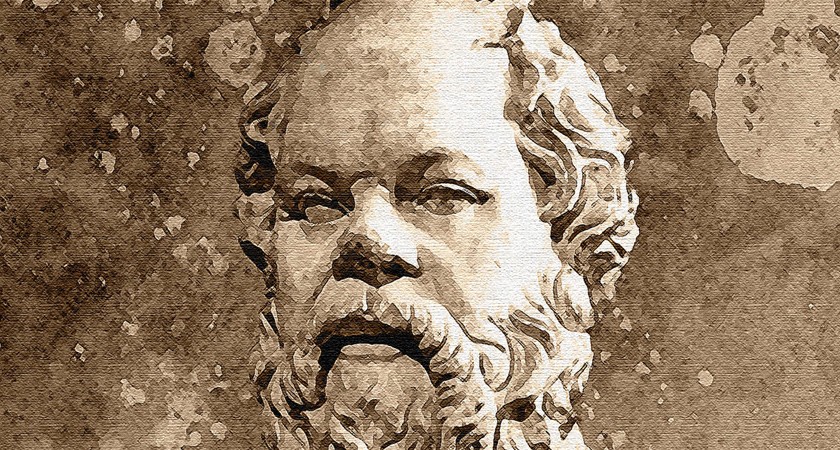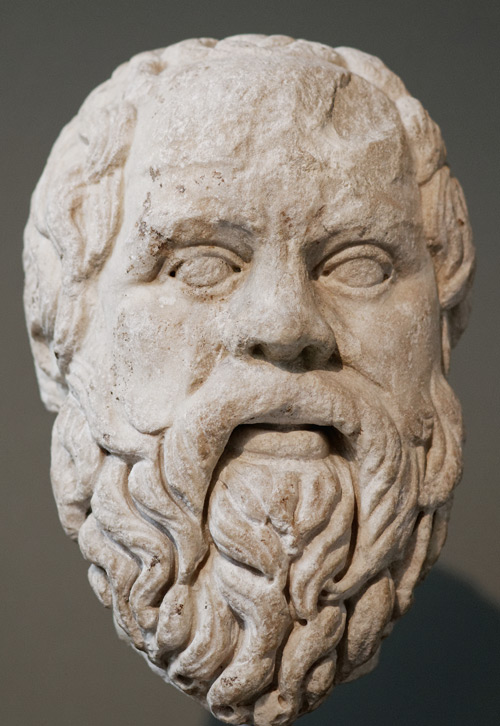Bildung
Socrates
The gift of ‘Athens’, the gift of Greek culture and Socrates in particular, is called paideia. Unfortunately, the English translation, ‘liberal education’, does not come close to what Socrates had in mind.
Paideia is the call to become man, to become who we should be, through education by culture. Culture, to Socrates, is not an anthropological concept (descriptive), but a normative instrument. We, human beings, are born with the same instincts as animals, we are equipped with many selfish desires, we can be overpowered by all kinds of moods – yet, through paideia, we can create a world in which there is truth and wisdom, where people are ‘bound together by fellowship and friendship, and order, temperance and justice’.
It is here, in Athens, that the idea of humanism was born. Not as the idea that the individual is all-important, but as the idea of man! The dignity of man, that is what humanity should cultivate, and can cultivate, through the formation of the human spirit, through the formation of the human character.
It is in acknowledging the difference between who we are and who we should be that we discover the need for ethics, for an ethos, for the character we need to have to become what we should be. This realization of ethics, the formation of our true character as an expression of our dignity, in one word: this paideia – is not a simple set of principles, but it is a way of life, and a lifelong effort.
To place man and not the gods at the center of our reflection, to ask questions and think instead of obeying myths and gods – that is what Socrates did when he started to ask that one crucial question: ‘So what is the human being?’ The answer he finds is: ‘The human soul’ – that which distinguishes us from all other creatures. If we want to do ourselves justice, the most important thing to do is: to care for our souls. As Socrates explains at the end of the trial in which he was sentenced to death:
‘If all of you, gentlemen of the jury, now tell me: “Socrates, we shall acquit you, but only on one condition, that you give up spending your time on this quest for truth and stop philosophizing”, I will reply, gentlemen, that as long as I draw breath and have my faculties, I shall never stop practicing philosophy and will keep on asking you: are you not ashamed that you give your attention to acquiring as much money as possible, and similarly with reputation and honor, and give no attention or thought to truth and understanding and the perfection of your soul?’
Our true happiness depends on the state of our souls, and that in its turn is the result of our paideia and capacity of doing justice.
If caring for the soul is what is most essential, then what is caring for the soul? How can we care for the soul?
Fundamental to Socrates’ idea of paideia is his argument that our soul is immortal. Immortal because it is the source of life, and therefore demands to be nourished and cared for in the best possible way. The best is that which is true, because what is deprived of truth cannot remain and will perish. There is a longing in every human soul to live in truth – which means that our soul takes part in only that which has real value, and that we practice those virtues that are necessary in order to live such a life. The values and virtues that are truthful and so care for our soul are called arête – excellent. Paideia is an education in all that is excellent. Excellent are all those values and virtues that have a life-giving quality. To be just, justice, is the ultimate value; because man never lives alone but is always part of a society, and it is only through justice that there can be harmony in a society, that a society can be able to flourish. The highest form of harmony, the most just life or way of living together, is friendship. And there is no friendship without true love – that is: love for the other human soul, not the body. Paideia means also an education in bravery, because we need to be brave to live according to the highest values, to be able to ignore ‘what the people may think’, and only be obedient to the truth. Paideia is always also an education in piety, as we have to respect and live in harmony with our cosmos.
More than anyone else Socrates was aware of the gap between our reality (our lives governed by urges, desires, emotions, fears, ignorance) and the true image of man. Brilliantly, he realized and declared:
‘Look, I am as ignorant as you are about what is good and what is true wisdom! I do not claim to know about these things. But because of that, I will search for it and my life will be a quest. I am not wise, but I am a philo-sophos, I am a lover of wisdom. And I urge you, my fellow citizens of this cosmos, to live this way, too.’
Recommended dialogues by Plato
Alcibiades, Apology, Gorgias, Phaedrus.

